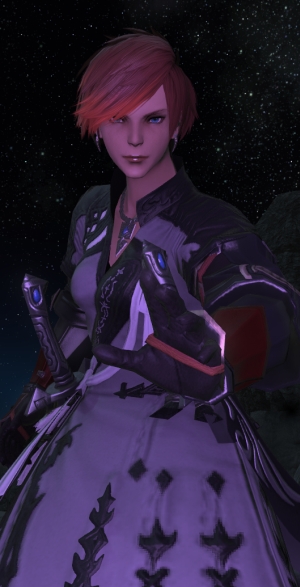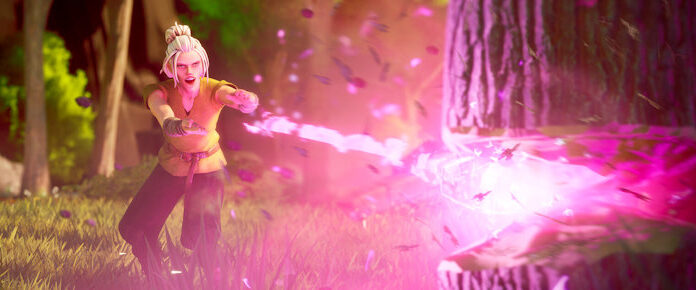
Obviously, for this column I’m going to be discussing spoilers for the MSQ. I am going to be doing so in a fashion designed to obscure as much information as possible for people who have not yet finished the plot, and I’ll spoiler out any big plot reveals, but be fairly warned as you dip into the comment section. But be fairly warned, there may be spoilers ahead. The good news is that spoilers don’t matter too much because even with them the plot is really good. And not really reliant on shocking swerves.
 That’s not to say there are no shocking reveals, of course; there are more than a few. But I felt like they belonged to a different class than the usual “here’s a terrifying new magical thing” that so often crops up. All of it was stuff that got telegraphed well in advance.
That’s not to say there are no shocking reveals, of course; there are more than a few. But I felt like they belonged to a different class than the usual “here’s a terrifying new magical thing” that so often crops up. All of it was stuff that got telegraphed well in advance.
In fact, the two plot points not telegraphed by the actual plot were actually the bits telegraphed by the nature of the game itself. You know as soon as two new primals are mentioned in marketing that eventually you’re going to have to fight them, and it’s not hard to suss out around what levels you’ll be facing off against them. One fight feels at least reasonably well-integrated, even if the actual appearance is not… the other is entirely a swerve into left field just to have a primal fight.
But it’s notable that these are the biggest blips on the radar. In fact, every other part of the plot feels much more… grounded. I’ve brought up Final Fantasy Tactics as a point of reference before, because that’s also a game in which magic plays an important role but the majority of the plot is driven by people doing things for their own reasons, with magic just trimming up the edges here and there.
And that’s a big chunk of why I like Stormblood’s plot so damn much. There’s no Ascian interference. There’s no powerful evil like Nidhogg hovering off in the horizon. There’s the Empire, and a particularly cold and durable head of the Garlean forces, and there’s a struggle for hearts and minds. There’s a lot of talk about what you’re willing to sacrifice, and all of the sacrifices made are of the sort that feel immediate in the moment rather than carefully planned Heroic Exits.
It is, in short, a story about people. Magic might form a backdrop, but it’s not the motivator.
Zenos and Yotsuyu both make for excellent villains, and both of them nicely serve in the role of “absolute evil” that usually houses deities or magical entities. Yotsuyu is an archetype the game’s story has played with before, someone damaged and hurt who takes the opportunity of power to deal that back to the world. She’s also a real example of the type, though; she’s a sad figure, but she’s also one with a nearly limitless capacity of cruelty.
On the other hand, Zenos is an interesting mix. We see signs that he is, in part, motivated by a hatred of the politics that tie his hands; he’s also motivated by the simple fact that he’s incredibly powerful and has very few real challenges. Narratively, he’s very much set up as the opposite number to the Warrior of Light, someone with a great deal of power and few opportunities to really feel any sort of challenge to that power.
I’m reluctant to call the whole thing a political drama, because there’s very little political work going on beyond the broadest scope, but it really does come down to the people involved. And I like that immensely; it makes the whole thing feel more real, more relatable.
Spoilers here about the final boss fight; be warned before clicking to reveal this paragraph.
The one thing that does bother me – and it seems as if it will be addressed in future patches, at that – is the fact that it seems remarkably easy to beat the Empire. Yes, the whole focus is on liberation, and the plot very much focuses on how difficult it is for people who have lost, time and again, to find the hope to keep fighting. That is executed wonderfully, and Yanxia contains one of my absolute favorite story sequences ever just because of that. Full kudos to the writers for that.
But we also seem to get several struggles wherein the main characters seem to just… walk to victory once that’s been accomplished. I get the goal, that the real struggle is in believing, but we don’t get a whole lot of sense sometimes of why believing is so difficult. There are setbacks, but they rarely feel like the sort that would render the empire as an unstoppable menace.
Of course, the story also hints that some of that is down to the fact that the Empire seems to have withdrawn inward somewhat and hasn’t put according pressure on its outlying conquests. Even so, it struck me as a little odd.
Ultimately, I’m actually more excited about the upcoming patches than I was in Heavensward, even though there were more obvious plot hooks for the follow-up there. Here, the plot feels as if it’s a bit more up in the air, but I can tell how much the writers have learned, and I’m fascinated by the prospect of what could come next. We’ve done the hard work of liberation, but rebuilding has yet to happen… and the hints have been sowed that it’s easier to topple something than rebuild. (Look at the history of Ala Mhigo, even.)
Also, I’d like to praise the writers for not having any characters I disliked as much as 2.0 Alphinaud or 3.0 Estinien.
Feedback, as always, is welcome in the comments down below or via mail to eliot@massivelyop.com. Next time around… I think we’ll have some Omega, won’t we? It’ll be Omega Time, as ominous as that sounds. Let’s talk about Omega.
 The Nymian civilization hosted an immense amount of knowledge and learning, but so much of it has been lost to the people of Eorzea. That doesn’t stop Eliot Lefebvre from scrutinizing Final Fantasy XIV each week in Wisdom of Nym, hosting guides, discussion, and opinions without so much as a trace of rancor.
The Nymian civilization hosted an immense amount of knowledge and learning, but so much of it has been lost to the people of Eorzea. That doesn’t stop Eliot Lefebvre from scrutinizing Final Fantasy XIV each week in Wisdom of Nym, hosting guides, discussion, and opinions without so much as a trace of rancor.













